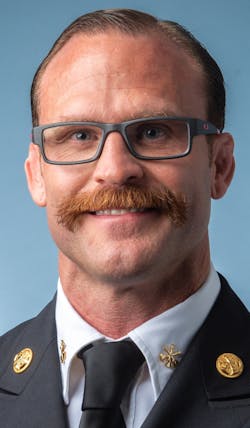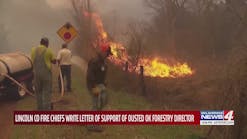Leadership Lessons: Quitter, Camper or Climber
When a new, progressive initiative is established, many people are intimidated by it. This doesn’t make them bad people; it just makes them human. It is important for us to realize that change and progress will present adversity to some organizational members. When this occurs, how do we deal with them in a positive manner, and how do we get a pulse on the situation? First, we must establish that there are three levels of personal adversity management that an individual can fall into—quitter, camper and climber.
Quitters cripple the crew
To lead off, let’s discuss the quitter because they will have the most negative effect on an organization. If this person is in a leadership position, such as a company officer, they will cripple a crew in a dangerous manner. They are not going to handle the change process effectively because, to them, quitting is easier than actually taking the change head on. More than likely, this person has very little ambition or creativity and will try to bring others down during the exciting times of progress.
As leaders trying to identify quitters, we must look for personnel who are disgruntled, who distance themselves from organizational values and processes, and whose work production and quality has fallen. This could be an individual who was once involved heavily in the department but decided to take their proverbial ball and go home because they couldn’t handle change. This is such a sad situation to see. I have unfortunately witnessed this from people whom I worked with and once looked up to. If you want a good example of this, think of Eeyore from Winnie the Pooh. You know who I’m talking about.
Campers are indifferent
A camper is someone who is not going to sway one way or the other. They are going to stay put and fly below the radar as long as they can. Their work will be average, they will not be involved in organizational initiatives, and they will not offer any new ideas to help with the progressive movement. This presents a challenge for a leader because a camper is not necessarily bucking the system, but he or she is not going out of their way to help with the progressive movement either. If we let these individuals linger in the camper mentality too long, we will lose them to the lower level of quitter. However, if we offer them proper coaching and inspiration, this can launch them to the most important level of personal adversity management: a climber.
Climbers welcome change
A climber is an individual who will take progress head on with a smile on their face. This has nothing to do with them “climbing rank.” I am referring to an individual who welcomes challenge and adversity because, in the end, they realize that the mission of our profession is not about them; it’s about ensuring our people go home after every shift. The more adversity they experience, the more successful they are. They live for the challenge. If that means that they use a new hose deployment, boom, they do it. If that means that they take pistol grips off of the nozzle, boom, they grab the wrench to make it happen. If that means that they wear a helmet that doesn’t have an eagle on it, boom boom, they are the first one to put it on.
Welcome to the new school
As a leader, when you buck a progressive initiative, your followers will be faced with a difficult situation: Do they follow you because you’re their immediate supervisor and they don’t want to disappoint you, or do they follow the organization’s mission because that’s more important? Why would you want to put your followers in this situation? Is it because of your ego? That doesn’t make any sense, does it?
As we’ve seen throughout all of our careers, progress is difficult. Get used to it. It is a necessity to ensuring that we provide the best service to our citizens and that our personnel go home to their families after every shift. If you want to go back to using the bucket brigade or a horse and steamer, great, go ahead. That doesn’t make you cool. That makes you outdated and in need of finding a new career. Those days are over. Yes, we are proud of our predecessors, but let’s also be proud of our future because, if you haven’t noticed, the future is now. Welcome to the NEW SCHOOL!

Dr. David Griffin
Dr. David Griffin is the assistant chief of administration in Charleston, SC. He was the operator of the first-due engine on June 18, 2007, when nine of his fellow firefighters perished. Griffin has come through the ranks in operations in every uniformed position, from firefighter to battalion chief and shift commander to his current position, during his 19-year career in Charleston. He has a bachelor's degree in education from The Citadel, a master's degree in executive fire service leadership, and a doctorate of education in organizational leadership and development. Griffin is the author of "In Honor of The Charleston 9: A Study of Change Following Tragedy," among three other books. He is an international speaker and instructor, a certified Chief Fire Officer and Chief Training Officer with The Center for Public Safety Excellence, an IFSAC/Pro Board-certified Fire Officer IV and a graduate of the Executive Fire Officer Program from the National Fire Academy. He is a graduate of Harvard University's Kennedy School of Executive Education program: Senior Executives in State and Local Government and of the Psychology of Leadership program at Cornell University's SC Johnson College of Business. Griffin is the owner of On A Mission, LLC, at drdavidgriffin.com.






